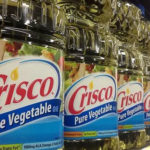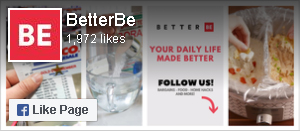Some Of The Most Unhealthy Foods In American Grocery Stores
1 Cup Noodles

I lived off of these and other types of instant noodles when I was in college. This is definitely the go-to quick snack for any student, or anyone who doesn’t feel like cooking, really. Not to mention that they are very inexpensive! But if I had known then what I know now, I never would have eaten so many of them.
Yes, they are quick, convenient and quite tasty, but they are also quite unhealthy. For example, Cup Noodles has a whopping 1,160 milligrams of sodium and 11 grams of fat, including 5 grams of saturated fat, in each cup. That’s more than half the recommended amount of sodium you’re supposed to consume in a day!
TIP
Make homemade instant noodles instead to ensure what you are eating is healthy.
2 Pop-Tarts
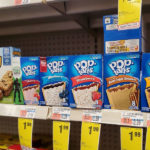
Who doesn’t love these pastries? I mean, they have everything a person with a sweet tooth would love—sprinkles, frosting, and a delicious filling. These breakfast treats also have a lot of things that aren’t good for our health. For example, there are 30 grams of sugar, 9 grams of fat and 370 calories in two frosted strawberry Pop-Tarts.
And it gets worse. There are some really scary ingredients in these breakfast pastries. For example, they contain TBHQ, or tert-butylhydroquinone. For those of you who don’t know what that is, tert-butylhydroquinone is a preservative that has been linked to liver enlargement, neurotoxic effects, convulsions, and paralysis.
3 Diet Soda
Diet soda has been around since the 1950s, but it really took off in the early 1980s when Americans got into the diet craze. These drinks were touted as healthy alternatives to regular soda and other sugar-laden drinks, but that couldn’t be anything further from the truth.
I mean, yes, these sodas have 0 sugar and 0 calories, but they have something else in them that makes them dangerous: artificial sweeteners. Artificial sweeteners have been linked to weight gain, and an increased risk for high blood pressure, fatty liver, diabetes, and obesity.
TIP
If carbonation is what you’re craving, opt for club soda instead.
4 Lunchables

Lunchables were all the rage with kids in the 90s. I’m sure parents loved them, too, because they made lunchtime so easy. But giving your kids these meals was definitely a bad idea.
In fact, health critics say that Lunchables lack nutritional value. An article that appeared in The New York Times said, “If you take Lunchables apart, the most healthy item in it is the napkin.” Ouch! I know that was a bit of a sting for the creators of this lunchtime meal, but I guess the truth hurts.
And speaking of the creators of Lunchables, did you know that Philip Morris, the largest tobacco company in the United States, used to be part of Lunchables’ parent company Kraft? I guess that explains everything.
5 Sugary Cereals

Sugary cereals have been scrutinized for years because their manufacturers market them to children, and anyone can see why folks aren’t happy about that. According to an article published by MoneyWise, a cup of Honey Smacks (one of my favorite cereals as a kid) contains more sugar than the average glazed donut. And that’s just the cereal by itself! When you add the milk, the amount of sugar increases.
Here’s another thing: these cereals are also made with white flour. As a result, they are high in refined carbs and low in nutrition. In other words, they can increase your blood sugar and insulin levels, make you crave other high-carb foods, and contribute to mood swings and low energy. Not exactly a good way to start your day.
6 SPAM
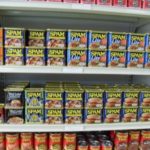
I’m not gonna lie, I used to eat this stuff. I’d fry it up for breakfast and eat it with grape jelly and a pancake or two. Unfortunately, I didn’t realize what I was putting into my body.
SPAM, although made up of just six ingredients, contains nearly 800 milligrams of sodium and 16 grams of fat in a single serving. And, to think, I used to eat about two servings for breakfast! In addition to salt and fat, SPAM also contains sodium nitrate, which has been linked to stomach cancer, pancreatic cancer, lymphoma, and heart disease.
FUN FACT
Hawaiians really love SPAM! SPAM products were adopted into their local culture and you can find SPAM dishes served everywhere in Hawaii, from convenience stores to restaurants.
7 Potato Chips
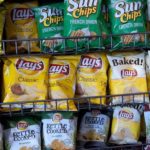
Potato chips can’t be bad for you, right? After all, they’re just vegetables. I’m sure that’s the logic a lot of people use to justify downing a bagful or two of these each week. Unfortunately, their logic is flawed. Here’s why…
There are eight servings in an 8-oz. bag of Lay’s Classic potato chips. A serving size is 15 chips. In those 15 chips is 170 milligrams of sodium, 10 grams of fat (including 1.5 grams of saturated fat), 15 grams of carbs, and 160 calories.
Because a serving size is only 15 chips, it’s easy to eat more than one serving. Factor in that the company doesn’t fill the bag all the way to the top (most of the time it’s only half full) and that Lay’s potato chips are so darn delicious, eating an entire bag in one sitting, or throughout the course of a day if you’re mindlessly munching, is entirely possible.
8 Frozen Pizza
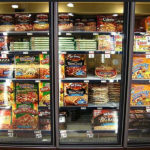
Ahh, pizza. One of America’s most beloved comfort foods. It’s also one of America’s unhealthiest foods. This is especially true for frozen pizza. That’s because these pies are highly processed and contain unhealthy fats, added sugar, artificial preservatives, and a ton of salt, which is used to preserve the food and enhance its flavor.
Consider this: just one serving of Red Baron Classic Crust Pepperoni Pizza contains 810 milligrams of sodium, not to mention 18 grams of fat and 8 grams of sugar. That being said, you have two options for consuming healthier pizza: order a fresh one from a local pizza shop or make your own at home.
9 Processed Meats

Whether it’s hot dogs, bacon, sausages, or cold cuts, processed meat is one of the worst things you can eat. For one thing, they’re high in sodium and fat. Second, they contain sodium nitrate and sodium nitrite, preservatives that, in high doses, can increase the risk of certain cancers.
Additionally, consumption of processed meats has also been associated with a higher incidence of coronary heart disease and diabetes.
TIP
Instead of using processed meats on sandwiches/wraps and in salads, opt for foods like canned tuna or slices of leftover home-cooked meats (e.g. chicken, turkey, pot roast, etc.). You could even opt for meat-free foods, such as egg salad or peanut butter.
10 Granola And Cereal Bars
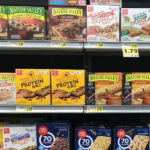
These are marketed as being healthy, but they are anything but good for you. That’s because both granola bars and cereal bars are loaded with sugar and fat, but contain very little fiber and protein, despite those two ingredients being the sole focus of the marketing campaigns the majority of the time.
Even the sugar-free variety can yield health problems due to the sugar alcohols they use to replace actual sugar. Consuming too much of this stuff can cause digestive issues.
And, here’s a not-so-fun fact: you’d be better off consuming things like pork tacos, butter, baked potatoes, and wine because they’re all considered to be healthier than granola bars.
11 Gatorade

Gatorade works wonders for replenishing your electrolytes. Unfortunately, that’s about as far as it goes when it comes to your body’s health.
You see, Gatorade is loaded with sugar. In fact, a single 12-ounce bottle has about 21 grams of sugar in it. The American Heart Association recommends no more than 25 grams of added sugar a day for women and 36 grams for men. So, if you down just one bottle of Gatorade, you’ve already met way more than half of your recommended daily intake of sugar.
That being said, if you’re not an athlete or you rarely work out, stick to plain water for your liquid intake and get your electrolytes from natural sources.
12 Canned Baked Beans
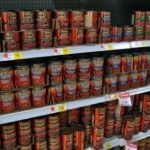
Beans are good for you. After all, they’re high in fiber, protein, and other vital nutrients. This is especially true for dried beans. The canned variety contains these nutrients as well, along with a bunch of other stuff that isn’t good for your body.
Bush’s canned baked beans, for example, are seasoned with bacon and brown sugar, which means they contain a lot of fat, salt, and sugar. And here’s another problem: canned beans, like many other canned foods, contain a chemical known as bisphenol A, or BPA. This chemical, which is found in the interior lining of the cans, can leach into the food and wreak havoc on your health. For example, studies have shown that BPA can increase your risk of obesity and reduce fertility.
13 Fruit In Syrup
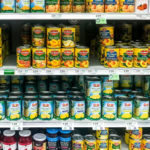
Fruit is definitely healthy. But if you’re going to eat it, fresh fruit is the best option, followed by flash-frozen fruit. That’s because canned fruit and fruit cup snacks often contain added sugars from the syrup they’re coated in. A perfect way to make food that is basically healthy, absolutely not healthy!
But it’s not just the fruit that’s been doused in syrup that you need to worry about. Even those that claim to be packed in real fruit juice can contain added sugars as well. For example, Dole peaches in 100% fruit juice contain 18 grams of sugar. That being said, make sure you check the label first if you insist on buying your fruit this way.
14 White Rice
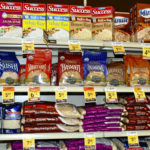
White rice is unhealthy because it’s a refined, processed grain. As a result, it has been stripped of valuable nutrients that work to help lower your cholesterol, move waste through your digestive tract, and keep your blood sugar in check. Speaking of blood sugar, consuming white rice in excess has a super negative impact on your blood sugar levels—so negative, in fact, that it has been linked to an increased risk of developing type 2 diabetes.
Thankfully, there are some tasty alternatives you can try. These include brown rice, riced cauliflower, quinoa, broccoli rice, shirataki rice, barley, couscous, amaranth, bulgur, buckwheat, and riced cabbage.
15 Energy Drinks
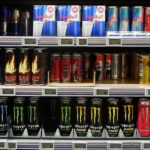
There’s a reason why energy drinks give you lots of energy: they’re loaded not only with caffeine, but also with sugar. Anyone with kids or who spends a significant amount of time around children knows exactly what can happen if you feed them too much sugar. They literally start bouncing off the walls!
The problem with consuming a lot of sugar is that it can lead to a whole host of health problems, including cavities, increased weight gain, and excess stress on your heart, which, over time, can lead to heart attacks, strokes, and heart failure.
Here’s another thing: energy drinks are also packed with artificial flavorings, and artificial flavors can cause inflammation of the body.
16 Meatless Burgers
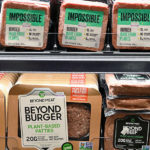
Believe it or not, meatless burgers sold by the Beyond Meat and Impossible brands are not as healthy as you think. Here’s why…
The Impossible Burger is made up of lots of synthetic ingredients that mimics the look and taste of real meat. Not only that, but this burger doesn’t even contain a complete protein like real meat does. And then there’s the Beyond Meat burger. It contains 260 calories, 18 grams of fat, 5 grams of saturated fat, and 350 milligrams of sodium.
Compare that to a 93% lean ground beef patty from Walmart. It contains just 160 calories, 8 grams of fat, 3 grams of saturated fat, and 85 milligrams of sodium. It’s clear, then, that these meatless burgers are no better (and in fact are likely much worse) than the real thing.
17 Artificial Sweeteners

Artificial sweeteners are supposed to be the healthy alternatives to refined sugar. Ironically, they can actually be worse for you than sugar “due to its potential health impact and unknown risks,” Prevention wrote on its website.
That being said, it’s best to stay away from artificial sweeteners and any products containing them (e.g. diet soda, sugar-free snacks, etc.) and just limit the amount of sugar you consume.
You could also sweeten your foods and beverages with honey or fruit, including miracle fruit/miracle berry, or mberry. Mberry, a fruit found on an evergreen shrub in West Africa, is known for its ability to make sour foods taste sweet.
18 Vegetable Shortening And Oil
Vegetable shortening and oil is proof that just because something is derived from a vegetable doesn’t make it healthy. For one thing, vegetable shortening contains hydrogenated oils (a.k.a. artificial fats). These oils can increase your bad cholesterol levels and lower the good ones.
Then, there’s cottonseed oil, which is a refined vegetable oil. In other words, it’s been highly processed. It’s also high in omega-6 fatty acids, which can lead to inflammation, which in turn can lead to diabetes and heart disease.
And, of course, who could forget about margarine? Made from vegetable oils, margarine contains trans fat. That being said, you’re better off sticking to real butter—but only in moderation.
19 Nutella
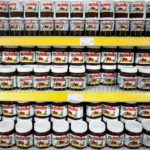
Nut butters are generally healthy. Nutella, however, is the exception to that rule. “Nutella is one of those foods that people believe to be healthy because it contains a nut,” Leah Kaufman, MS, RD, CDN, told Eat This, Not That! “But check the ingredients: Spreads like Nutella are primarily sugar and palm oil, with almost no actual nuts involved. With over 20 grams of added sugar and only two grams of protein, the spread just winds up at your waist.”
In addition to having over 20 grams of added sugar in just one serving, the same serving size of this nutty spread also contains 200 calories and 4 grams of saturated fat.
TIP
Stick to traditional seed and nut butters like peanut butter and almond butter. Just make sure to choose natural butters to avoid added sugar and unhealthy fats.
20 Juice Cocktail
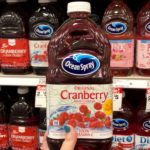
Juice is healthy, especially if it’s freshly squeezed. Juice cocktail, on the other hand, is anything but healthy. Unfortunately, the word “juice” leads many folks to believe otherwise.
“The word ‘cocktail’ indicates that a juice is mixed with added sugar,” Amy Gorin, M.S., R.D.N., owner of Amy Gorin Nutrition in the New York City area, told Prevention. “This is unnecessary and adds extra calories to your day.”
That being said, skip the cocktail stuff and other bottled juices, too. This includes cold-pressed juice as well, which is much healthier than other bottled juices, but can still wreak havoc on your blood sugar levels because cold pressing fruits removes the pulp—the area where the fiber is stored—from them. The fiber is what keeps you feeling full longer, and removing it can cause you to reach for additional calories to try to feel satiated.

